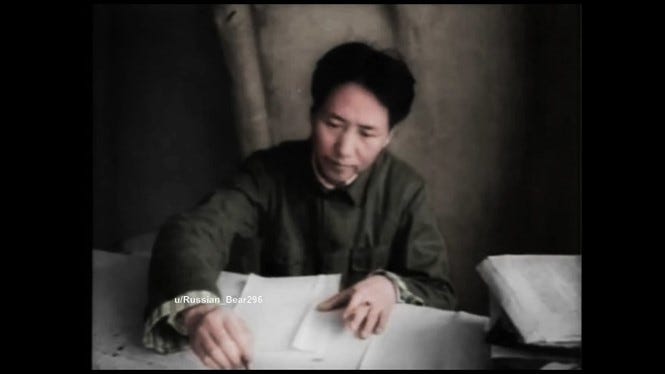Loushan Pass
[a tsu, to the melody Thinking of the Maid of Chin, Yi Chin-O]
[translated by Nancy Lin]
Keen is the west wind.
Across the vast sky
Wild geese honk to the moon of a frosty dawn.
A frosty dawn –
Horse hoofs clatter sharp,
Bugles sob low.
‘Ironclad’, they boast of this proud pass.
But this day, in one stride,
We’ve left it well behind!
Well behind.
The hills are a sea of blue;
Blood-dyed, the sun dips!
Notes [by Nancy Lin]
October 1934, the Long March formally began. After breaking through 4 blockade lines on its way from Kiangsi through Kwangtung, Hunan and Kwangsi, the Red Army reached Kweichow in December. In the deep of night, January 4, 1935, it entered Tsunyi, the second largest city of the province. Four days later a Party conference at Tsunyi definitely established Mao’s leadership in the CPC. On January 19, the Red Army, a reduced force of 30,000 men now, struck north through the Loushan Pass, a strategic mountain stronghold leading to Szechuan Province, with a view to crossing the Yangtse at a point between Yipin and Luchow in Szechuan. Blocked by Chiang’s troops, the Red Army turned back for the Pass, where it encountered Chiang’s garrison on February 25 morning but succeeded in overcoming it in the afternoon through tactics of evasion and surprise attack.
The poem was written right after the event.
The re-crossing of the Loushan Pass was a significant landmark in the saga of the Long March. For with it, the Red Army took a route further west over the Golden Sand River (the Chinsha River) at the Yunnan-Szechuan border which eventually led to Yenan, the destined goal.
Commentators have disputed over the time and scene of this poem. The following reported remark by the poet in February 1964 – authentic in all appearances – should settle the matter:
“Time: February. Frost in February, because it’s warmer in the south. The incredulous will find this to be the case by a visit down south. The scene occurred on the same day, not on successive days. We left the Loushan Pass in the morning after encountering a strong enemy contingent, but took the Pass in the afternoon by a surprise comeback over a different route.”
The first stanza, therefore, describes the morning scene and the swift covert march, while the second refers to the triumph in the afternoon, ending up with a broad scenic sketch of two laconic lines compelling in its suggestion of awe and destiny.
[next - 14. Three poems to the Mountains]



